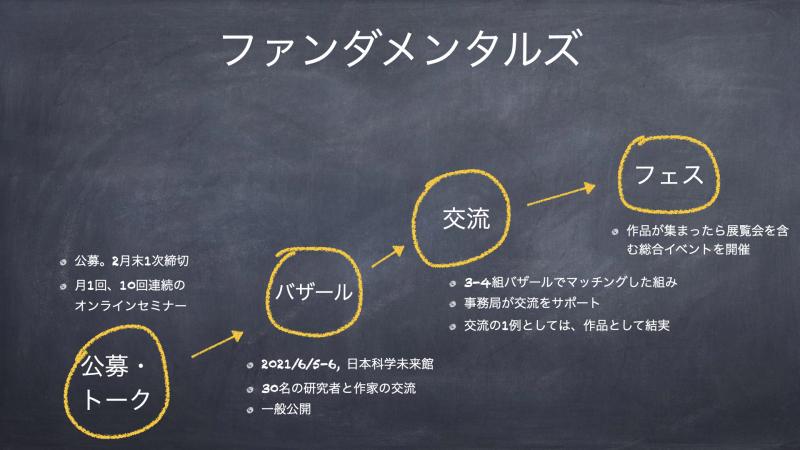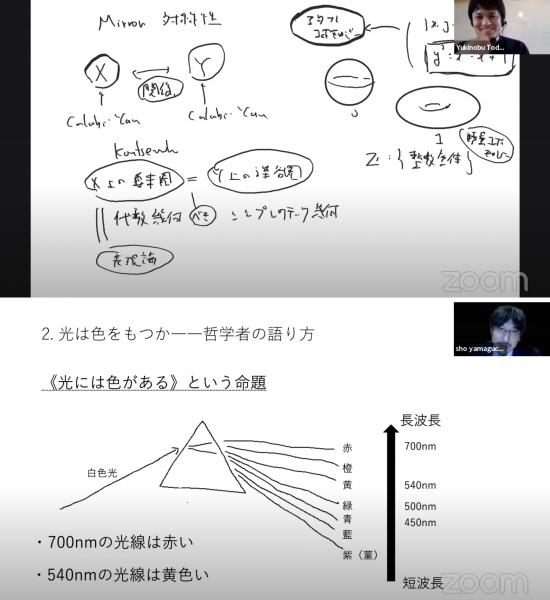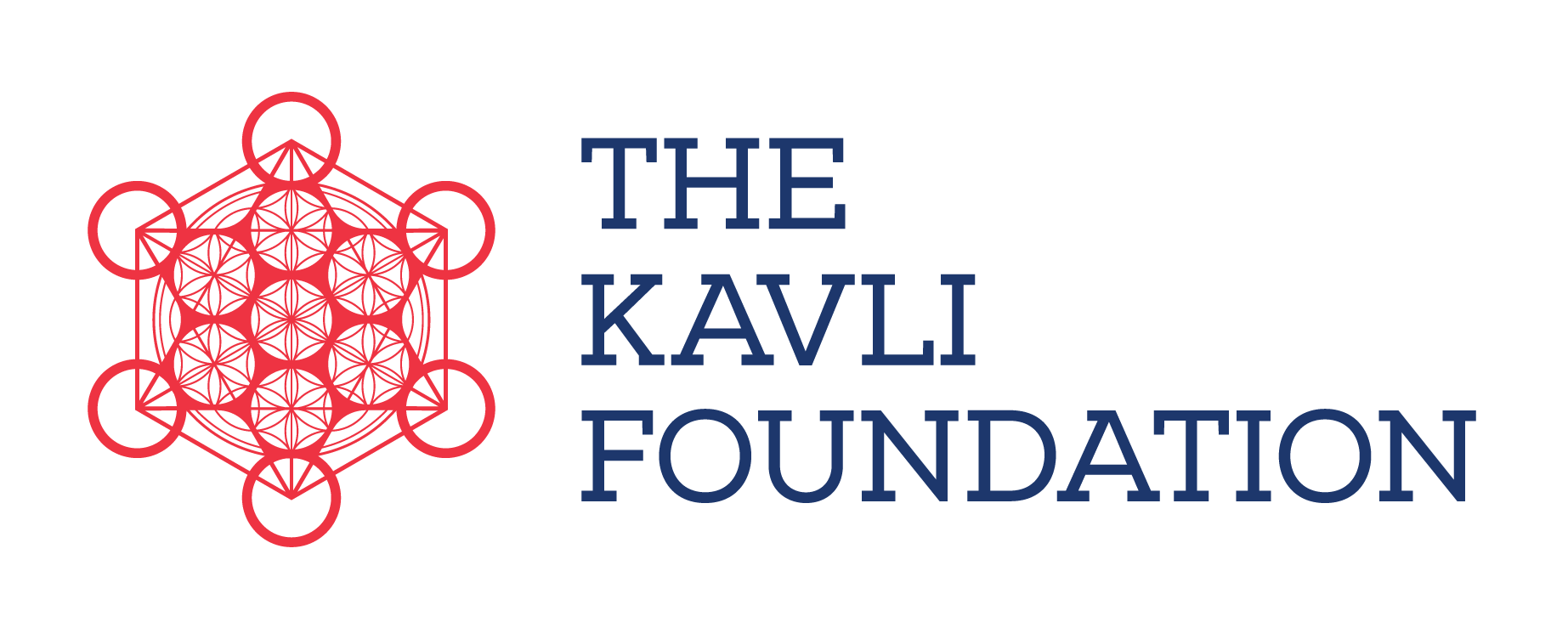2020/09/15
Kavli Institute for the Physics and Mathematics of the Universe (Kavli IPMU)

The Kavli IPMU continues to hold “Fundamental Talks,” an online seminar series on science and art, in collaboration with the Japan Association of Communication for Science and Technology (JACST).
“Fundamentals Bazaar,” a meet up event for scientists and artists, is planned to be held on June 5 and 6, 2021, at the National Museum of Emerging Science and Innovation (Miraikan). This event will be partly open to the general public. The goal of the Fundamentals talk series is to deepen exchanges among scientist, artists and the general public until the event.
Fundamental Talks, , are composed of two different kinds of talks. In one kind, we will invite experts in the humanities and arts to provide diverse prospectives on the essence of art and science. In the other kind, we will invite researchers, who belong to the institutions to which members of JACST belong, to introduce a sampling of cutting-edge science. Both kinds of talks will be held each month, one after the other.
(Archives are available here: https://www.fundamentalz.jp/fundamentalztalk)
- SESSION 1:
“Mathematics—how to interact with objects in a non-everyday manner,” by Yukinobu Toda (Mathematician) - SESSION 2:
“What We Talk About When We Talk About Color Quality for Science, Art or Philosophy,” by Sho Yamaguchi (Philosopher)
(Archived session available here: YouTube (in Japanese))
 INTRODUCTION:
INTRODUCTION:
In the middle of a pandemic, and with our daily lives disrupted, we are left re-examining the fundamental questions in all aspects of life. In both Fundamentals Bazaar and Fundamental Talks, we define the researchers in cutting-edge science fields and artists in contemporary art as “fundamentals”—inventors who seek something “fundamental,” “essential,” or akin to truth. Our purpose is to establish a platform where fundamentals can “escape” their usual work and pursue that which is fundamental—and to do so in their own, individual way. What’s more, the idea of the significance and importance of the fundamental pursuits will be raised to the general public.
At the Fundamentals Bazar, around 30 experts—half hailing from cutting-edge science, while the rest coming from contemporary arts fields—will gather. The event will be partly open to the general public. Currently, a call for participants to Fundamentals Bazar is open for researchers and artists, with the deadline for applications set for the end of February 2021.
The online Fundamental Talks series also serve as briefing sessions for Fundamentals Bazar. Please feel free to ask any questions during such sessions.
PROGRAM LIST
Math:
- AUGUST 2: “Mathematics—how to interact with objects in a non-everyday manner,” by Yukinobu Toda (Mathematician)
Science and Art (1: Premises):
- SEPTEMBER 14: “What We Talk About When We Talk About Color Quality for Science, Art or Philosophy,” by Sho Yamaguchi (Philosopher)
- OCTOBER 30: “The mechanics of how the brain senses the world—a study on the smell [[?]] of space,” by Hokuto Kazama (Neuroscience)
- NOVEMBER 20: “Something between art and science—the occurrence of “readymade” by Marcel Duchamp,” by Takuya Nakao (Art Critic)
- DECEMBER 12: “Analogy-based development: the methods of Physics and the Arts,” by Koji Hashimoto (Theoretical Physics)
- JANUARY: “bio-aesthetics: Scientists who have tools other than the scientific method (tentative),” by Hideo Iwasaki (Biology / BioArt)
Science and Art (2: Towards a consequence/conclusion)
- FEBRUARY: “Truth in Art (tentative),” by Kenta Kodaira (Arts / Hermeneutics)
- MARCH: “Title (To Be Confirmed),” by Kim Satbyul (Visual Anthropology)
- APRIL: “Mathematics and the Sensory World (tentative),” Shinichiro Higashi (History of Science)
- MAY: “Title (To Be Decided),” by [[member of the Research Institute for Humanity and Nature]]
Art
- MAY: “Abstract in Art,” by Kenjiro Okazaki (Art / Criticism)
OVERVIEW
Title: Fundamental Talks
URL: https://www.fundamentalz.jp/fundamentalztalk
Date and Time: 90 mins, once a month (Please refer to the URL, above)
Venue: Online (JACT’s YouTube channel)
Target: professionals of contemporary art and cutting-edge science; junior high school and high school students; adults
Fee: None
Application: None (pre-application may be required in certain cases)
Organizer: Japan Association of Communication for Science and Technology (JACST)
Co-host: Kavli Institute for the Physics and Mathematics of the Universe (Kavli IPMU)
Funding: Tokyo Metropolitan Foundation for History Culture / Arts Council Tokyo
Partner: Graduate School of Science, Osaka University
About JACST
Established in 2007 as the Japan Association of Communication for Science and Technology (JACST), the organization consists of 200 members engaged in public relations in over 80 science institutions. JACST is an independent, mutual cooperation association where members share best practices, support their mutual development, and grow as a community. JACT’s subcommittee for “the study of public relations for the benefit of science promotion by cooperating with adjacent disciplines” consists of public relations officers and the University Research Administrators; the Graduate School of Science, Osaka University; the Kavli Institute for the Physics and Mathematics of the Universe (Kavli IPMU); the National Institutes for the Humanities (NIHU); the Research Institute for Humanity and Nature (RIHN); and, the RIKEN Center for Brain Science (CBS). Adjacent disciplines include the arts and philosophy.
About Kavli IPMU
In 2007, the Institute for the Physics and Mathematics of the Universe (IPMU) was incorporated by the Ministry of Education, Culture, Sports, Science and Technology (MEXT) as a World Premiere International Research Center Initiative (WPI) within the University of Tokyo. Around 100 researchers in three fields—mathematics, physics, and cosmology—gather there from around the world to collaborate. Together, they seek answers to five mysteries about the universe: what is it made of; how did it begin; what is its fate; what are the laws that govern it; why do we exist? In 2012, IPMU become the Kavli Institute for the Physics and Mathematics of the Universe (Kavli IPMU) following an endowment by the Kavli Foundation in the United States. Researchers at the Kavli IPMU have produced numerous internationally co-authored papers that have been citied widely. Hirosi Ooguri, who has specialized in particle physics since 2018, is the institute’s director.
Contact
Aya Tsuboi
Public relations officer
Kavli Institute for the Physics and Mathematics of the Universe (Kavli IPMU) /
JACST (the study of public relations for the benefit of science promotion by cooperating with adjacent disciplines, subcommittee)
Chair
E-mail: contact_at_fundamentalz.jp
TEL: 04-7136-5981
Please change * _at_ to @






